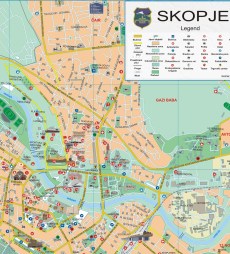We’re approaching the post-PC era, according to many sources. If we switch our focus away from the icon of the phenomena (iPad), what this basically means is that the traditional personal computer is losing its status as the default device for all data processing and information management tasks that we perform as either employees at work or free individuals at home. Instead we’re increasingly turning to mobile devices that are always with us, always on and always connected.
Nowhere else is mobility more central than when travelling abroad, away from your familiar services and surroundings. It would therefore be perfectly natural to assume that the traveller segment would be the one that mobile service providers would be actively looking to cater for. Yet the reality is completely the opposite: mobile operators are making sure that no sane person uses mobile data while travelling abroad, thanks to the ridiculous prices of data roaming.
Going on the road? Let’s burn the books & switch off
Last week I was travelling in Macedonia, a potential candidate for becoming an EU member. An exotic location to some extent, as I hadn’t been to any of the former Yugoslavia countries, but at the same time not too distant from the average central European culture. Skopje, their capital city, is not exactly on the top 20 list of cities for tourists to visit, so there wasn’t any paper guidebooks available to take with me. I did download the Skopje In Your Pocket guidebook into my Kindle, but the painful rendering of PDF magazines on the small black & white ePaper screen meant I hardly opened the document. Instead I decided to try and rely on content that I could use on my HTC Desire HD.
 The price for mobile data use in Macedonia was according to my Finnish operator’s (DNA) pages a bit over 10 euros per megabyte. Ok, so the first thing to do before boarding the plane was to disable all APN information to make sure that zero bytes would be transferred over the mobile operators’ networks. Hey, what else is new?
The price for mobile data use in Macedonia was according to my Finnish operator’s (DNA) pages a bit over 10 euros per megabyte. Ok, so the first thing to do before boarding the plane was to disable all APN information to make sure that zero bytes would be transferred over the mobile operators’ networks. Hey, what else is new?
A key criteria in selecting our hotel in Skopje had been the availability and visitor ratings on free WiFi connectivity. Even if there was to be no hotspots discovered while out on the town, at least the hotel would serve as a home base for downloading information on sights to see and pubs to visit. In preparation for the times without a network, I had installed the Maps(-) app from Androind Market and downloaded offline Google maps data of the city.
Fortunately it was not too difficult to discover open, free WiFi networks while walking in the center of Skopje. Cafes and shopping centers tended to frequently have a network of decent quality. Outdoor signs of a free T-Mobile hotspot being available to the customers made selecting the restaurants quite a bit easier.
(Non-)Economics of data roaming
 During the 3 day visit I ranked up in total 300 MB of data transfer over WiFi. While I did frequently perform Google searches, check into Foursquare (and of course Untappd while going round the pubs!), browse FB/Twitter streams etc., none of the use was particularly data intensive. No video or audio transmitter, just your everyday transactions with applications that have become a part of my daily routine.
During the 3 day visit I ranked up in total 300 MB of data transfer over WiFi. While I did frequently perform Google searches, check into Foursquare (and of course Untappd while going round the pubs!), browse FB/Twitter streams etc., none of the use was particularly data intensive. No video or audio transmitter, just your everyday transactions with applications that have become a part of my daily routine.
How much would have all this mobile data connectivity cost if I had stayed APN enabled and used the 3G network provided by the local telecom operator? Over 3000 euros. Wow. That’s ten times more than what I paid for the flights and hotel altogether. I could have travelled around the world with that money.
How much did I end up paying for the mobile data connectivity while travelling in Macedonia? Zero euros. That’s right, the local economy received more of my money through bubblegum purchases than through offering me telecommunications services.
How much value did I receive from having a mobile device with Internet connection available to me during my travels? Quite a lot, and I expect that value only to increase in the future when the apps and databases available become even more useful. Would I have been willing to pay something for the convenience of not having to hunt for hotspots and just rely on an always-on 3G data connection. Of course I would have!
So, what was your business again?
Call it what you want and reason it how ever which way you like, but in my eyes the continuing state of data roaming pricing in Europe (and of course globally in most places) deserves to be labeled as pure insanity. Insanity particularly therefore that the operators are continuing to do the same thing (preserving an ancient “per MB” pricing model) and expect different results (more revenue from mobile application users).
When debating over the right price point for mobile data plans, the operators all around the world are nowadays trying to claim they can’t offer “all you can eat” pricing anymore due to the increase of smartphones and the lack of 3G/4G network capacity. While there may be a hint of truth in that, it’s important to remember this doesn’t in any way justify the exorbitant pricing of data roaming. Foreign users are at any given time and location going to represent only a fraction of the total user volume for an operator. All the investments needed are in the billing systems and agreements between operators.
The real leasson from this sad situation is that in order to make money through service innovations you don’t necessarily need any new technology. The technology for providing effortless mobile Internet connectivity to tourists has already been built and paid for. Nothing is missing, except offering the service in the form of a feasible product. At the same time, the Internet (as a conscious entity, in the vain of Skynet, Google et al) is working its way around this lack of operator products by making it increasingly easy for local entrepreneurs to punch holes into this firewall by setting up open WiFi hotspots. These holes provide connections to the backbone network of mostly the very same operators and allow the tasty app juice of our post-PC era cloud applications to flow into the mobile devices of vigilant vistors.
Everywhere you go, the cloud follows
Ok, so you may not always have high quality connection to the web, meaning you can’t rely on it to be always there to answer your questions, but the same goes for 3G connections as well. GPRS is in many ways equal to “no connection”, at least when you consume on average 100 MB of data per day. Once you do have a working connection, the big clouds are all there for you to reach into, with their unlimited and ever evolving means of communication and information discovery.
 It’s good to note that not even the ancient technology of SMS was reliable enough to be transmitted between Finland and Macedonia, as many messages were delayed or remained missing. At the same time, whenever I had access to Gmail or Facebook I was able to utilize their full feature set as if I had been sitting at home, typing on my laptop. In short, there wasn’t anything that I wanted to do but was unable to do when equipped with my Android smartphone instead of lugging around a mini-PC.
It’s good to note that not even the ancient technology of SMS was reliable enough to be transmitted between Finland and Macedonia, as many messages were delayed or remained missing. At the same time, whenever I had access to Gmail or Facebook I was able to utilize their full feature set as if I had been sitting at home, typing on my laptop. In short, there wasn’t anything that I wanted to do but was unable to do when equipped with my Android smartphone instead of lugging around a mini-PC.
Feel free to disagree, but to me that is a sure sign of the coming post-PC era where both the traditional telecom operator services such as phone calls & text messages as well as traditional keyboard + mouse + monitor + CD-ROM computing paradigms are in danger of slowly becoming extinct. I won’t be living without a “PC” or leave home without a “phone”, but I’ll care less and less about services built specifically around those old conceptual silos. I will just replace them with “everything”, which means anyone can provide services for them.
Waisting more of our time while connected
As a final note, during the trip I was once again reminded of the fact that Google couldn’t make social applications if its life depended on it (and pretty soon it does). Mr. Scobleizer wrote a great post on the topic of how the best applications are the ones that enable us to waste our time more efficiently. That’s exactly the kinds of mobile apps that you need while travelling in a foreign country.
Google Places turned out to be in practice almost useless, while Foursquare actually provided quite satisfactory results most of the time. Particularly the new Explore tab in their mobile application provided a convenient stream of relevant information to a visitor in a foreign country. If only the Macedonian people would have submitted their comments in English, since the local cyrillic alphabet makes it impossible to even make guesses about what the text might mean…



So, here’s the thing. In the US, the telephone company (ATT, then numerous after the split) wasn’t interested in laying cable to the extreme rural areas because they ran the numbers and decided it wasn’t “profitable enough”. As in, they would make some profits but not as much as they wanted.
State representatives got together, said this wasn’t acceptable from a business which enjoyed numerous tax breaks and services provided by the government, and required them by law to lay the cable and provide the service, which had become a utility of sorts in its essential nature. That was, in turn, subsidized by a required Universal Charge on phone bills in the US.
The same thing is happening to mobile phones across the world, they are becoming ubiquitous utilities and a requirement for functioning in modern society. Not completely there yet, but getting there. The same kind of level playing field for consumers hasn’t reached critical mass yet. The mobile operators – around the world, not just in the US – are doing their best to lobby governments to keep things the way they are, which is not advantageous for consumers in any way, yet there they are still operating in the same manner. They know they have to reap the profits that they can get now before they are forced to provide services in a fair and peering manner without gouging. Otherwise, no tax breaks, no transport discounts, no low interest municipal loans. Will it get better? Eventually, but it’s going to take more outrage and more reason about quid pro quo with threat of the stick before these corporations are going to cease anti-consumer monopolies.